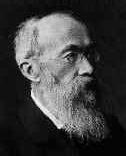Wilhelm Wundt
| Wilhelm Wundt | |
 |
|
| Born | August 16, 1832 Neckarau near Mannheim, Grand Duchy of Baden |
|---|---|
| Died | August 31, 1920 (aged 88) Großbothen near Leipzig, Germany[1] |
| Residence | Germany |
| Nationality | German |
| Fields | Psychology, Physiology |
| Institutions | University of Leipzig |
| Alma mater | University of Heidelberg |
| Doctoral students | Edward B. Titchener, G. Stanley Hall, Oswald Kulpe, Hugo Munsterberg, Vladimir Bekhterev, James McKeen Cattell, Lightner Witmer[2] |
| Known for | Psychology, Structuralism |
Wilhelm Maximilian Wundt (August 16 1832-August 31 1920) was a German medical doctor, psychologist, physiologist, and professor, known today as one of the founding figures of modern psychology. He is widely regarded as the "father of experimental psychology".[3][4][5] In 1879, Wundt founded one of the first formal laboratories for psychological research at the University of Leipzig, and the first journal for psychological research in 1881.
Contents |
Biography
Formative years
Wundt was born at Neckarau, Baden, as an only child to parents Maximilian Wundt (a Lutheran minister), and his wife Marie Frederike. He studied from 1851 to 1856 at the University of Tübingen, University of Heidelberg, and the University of Berlin. After graduating in medicine from the in Heidelberg (1856), Wundt studied briefly with Johannes Peter Müller, before joining the University's staff, becoming an assistant to the physicist and physiologist Hermann von Helmholtz in 1858. There he wrote Contributions to the Theory of Sense Perception (1858-62).[6] He married Sophie Mau while at Heidelberg. It was during this period that Wundt offered the first course ever taught in scientific psychology, all the while stressing the use of experimental methods drawn from the natural sciences, emphasizing the physiological relationship of the brain and the mind. His background in physiology would have a great effect on his approach to the new science of psychology. His lectures on psychology were published as Lectures on the Mind of Humans and Animals in 1863. He was promoted to Assistant Professor of Physiology at Heidelberg in 1864.[6]
Wundt applied himself to writing a work that came to be one of the most important in the history of psychology, Principles of Physiological Psychology in 1874. The Principles utilized a system of psychology that sought to investigate the immediate experiences of consciousness, including feelings, emotions, volitions and ideas, mainly explored through introspection, or the self-examination of conscious experience by objective observation of one's consciousness.[6]
Wundt's work and influence on modern psychology
Wundt sought to understand the human mind by identifying the constituent parts of human consciousness, in the same way that a chemical compound is broken into various elements. Thus, Wundt essentially imagined psychology as a science, much like physics or chemistry, in which consciousness is a collection of identifiable parts. Parts of Wundt's system were developed and championed by his one-time student, Titchener, who described his system "Structuralism." Several of Wundt's works, including Principles of Physiological Psychology are considered fundamentally important texts in the field of psychology. Though widely recognized as important in the birth and growth of psychology, his influence in psychology today is a subject of debate among experts.
Though Wundt wrote extensively on a variety of subjects, including philosophy, physics, physiology, and of course psychology, the immensity of his collected writings and the 65 year-long duration of his career makes it difficult to identify a single, coherent mode of thought.[7] Wundt is argued by some writers to have been a devout foundationalist, working tirelessly to understand the intricacies of the areas of knowledge he studied to form a coherent, atomistic understanding of the universe.[8] In recognition of Wundt's work, the American Psychological Association established the "Wilhelm Wundt-William James Award for Exceptional Contributions to Trans-Atlantic Psychology", which recognizes "a significant record of trans-Atlantic research collaboration." [9]
Several of Wundt's students became eminent psychologists in their own right. They include: the German Oswald Külpe (a professor at the University of Würzburg); the Americans James McKeen Cattell (the first professor of psychology in the United States), G. Stanley Hall (the father of the child psychology movement and adolescent developmental theorist, head of Clark University), Charles Hubbard Judd (Director of the School of Education at the University of Chicago), Hugo Münsterberg (who contributed to the development of industrial psychology and taugh at Harvard University), Edward Bradford Titchener (who founded the first psychology laboratory in the United States at Cornell University), Lightner Witmer (founder of the first psychological clinic in his country); the English Charles Spearman (who developed the two-factor theory of intelligence and several important statistical analyses - see Factor analysis, Spearman's rank correlation coefficient); the Romanian Constantin Rădulescu-Motru (Personalist philosopher and head of the Philosophy department at the University of Bucharest).
Wundt's laboratory students called their approach Ganzheit Psychology ("holistic psychology") following Wundt's death. Much of Wundt's work was derided mid-century in the United States because of a lack of adequate translations, misrepresentations by certain students, and behaviorism's polemic with the structuralist program. Titchener, a two-year resident of Wundt's lab and one of Wundt's most vocal advocates in the United States, is responsible for several English translations and mistranslations of Wundt's works that supported his own views and approach, which he termed "structuralism" and claimed was wholly consistent with Wundt's position.
Titchener's focus on internal structures of mind was rejected by behaviorists following the ideas of B. F. Skinner; the latter dominated psychological studies in the mid-1900s. Part of this rejection included Wundt, whose work fell into eclipse during this period. In later decades, his actual positions and techniques have seen reconsideration and reassessment by major psychologists.
An optical illusion described by him is called Wundt illusion.
Notes and references
- ↑ Image:Wilhelm Wundt Gravestone.jpg
- ↑ Wilhelm Wundt and William James
- ↑ Wilhelm Maximilian Wundt (Stanford Encyclopedia of Philosophy)
- ↑ Butler-Bowdon, Tom. 50 Psychology Classics, (2007): p. 2.
- ↑ http://wilhelmwundt.com/index.htm
- ↑ 6.0 6.1 6.2 "Wilhelm Maximilian Wundt", in Stanford Encyclopedia of Philosophy, section on "Life and Times"
- ↑ Wilhelm Maximilian Wundt (Stanford Encyclopedia of Philosophy)
- ↑ Wilhelm Maximilian Wundt (Stanford Encyclopedia of Philosophy)
- ↑ Wilhelm Wundt-William James Award for Exceptional Contributions to Trans-Atlantic Psychology
- Carpenter, Shana K (August 2005). "Some neglected contributions of Wilhelm Wundt to the psychology of memory.". Psychological reports 97 (1): 63–73. doi:. PMID 16279306.
- Steinberg, H (November 2001). "[The psychologist and philosopher Wilhelm Wundt and a dedication by his student Emil Kraepelin]". Der Nervenarzt 72 (11): 884. PMID 11758098.
- Ziche, P (1999). "Neuroscience in its context. Neuroscience and psychology in the work of Wilhelm Wundt.". Physis; rivista internazionale di storia della scienza 36 (2): 407–29. PMID 11640242.
- Smith, R (November 1982). "Wilhelm Wundt resurrected.". British journal for the history of science 15 (51 Pt 3): 285–91. PMID 11611088.
- Bringmann, W G; Balance W D, Evans R B (July 1975). "Wilhelm Wundt 1832-1920: a brief biographical sketch.". Journal of the history of the behavioral sciences 11 (3): 287–97. doi:. PMID 11609842.
External links
- Detailed study by Alan Kim at Stanford Encyclopedia of Philosophy
- Principles of Physiological Psychology
- Outlines of Psychology
- Wilhelm Wundt - Father of Psychology
- Biography and bibliography in the Virtual Laboratory of the Max Planck Institute for the History of Science
- Wilhelm Wundt entry in the Stanford Encyclopedia of Philosophy
Works online
- Ethics: An Investigation of the Facts and Laws of the Moral Life. Volume 1. (Tr. Edward B. Titchener et al.) Second Edition, 1902. University of Michigan.
- Lectures on Human and Animal Psychology. (Trs. Edward B. Titchener and James E. Creighton.)
- Second Edition, 1896. Harvard.
- Fourth Edition, 1907. Stanford; UCLA; University of Illinois.
- Outlines of Psychology. (Tr. Charles Hubbard Judd.) Second Edition, 1902. Stanford.
- Principles of Physiological Psychology. Volume 1. (Tr. Edward B. Titchener.)
- First Edition, 1904. Harvard; Lane; University of Michigan; HTML.
- Second Edition, 1910. UCLA.
|
|||||||||||||||||||||||||||
